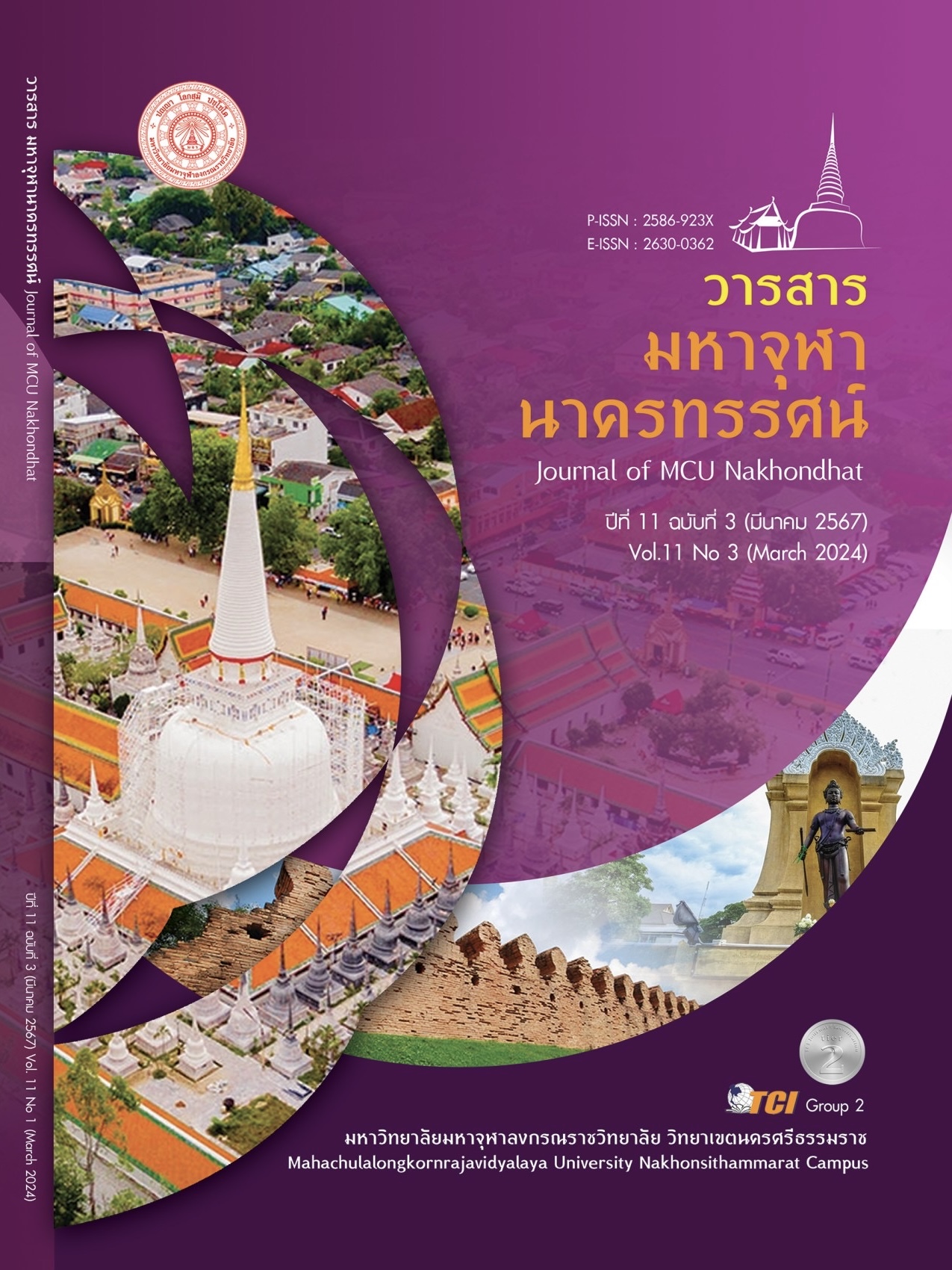ONLINE ADVERTISING MEDIA EXPOSURE ATTITUDE TOWARDS BRAND AMBASSADOR AND BRAND IMAGE THAT INFLUENCES THE INTENTION TO PURCHASE CELINE BRAND PRODUCTS
Main Article Content
Abstract
This study aimed to examine 1) Investigate the differences between demographic characteristics and online advertising receptiveness using celebrities as brand ambassadors.
2) Examine the relationship between online advertising receptiveness and purchase intention.
3) Explore the relationship between attitudes towards brand ambassadors and purchase intention.
4) Study the relationship between brand image and purchase intention. 5) Assess the influence of online advertising receptiveness, attitudes towards brand ambassadors, and brand image on the purchase intention of CELINE brand products. It’s a quantitative study with a sample of 400 participants who were at least 18 years old and individuals interested in branded products who have seen images of Lisa, Blackpink, and CELINE brand products online. Data were gathered through a questionnaire, while descriptive statistics, including percentages, means, and standard deviations, were utilized to examine the results. Research hypotheses were tested with inferential statistical analysis in the form of a t - test, one-way ANOVA, correlation statistics, and multiple regression analysis. The findings reveal that 1) Different demographic characteristics such as gender, age, and occupation have a significant impact on online advertising receptiveness. 2) Online advertising receptiveness is correlated with purchase intention. 3) Attitudes towards brand ambassadors are related to purchase intention. 4) Brand image is associated with purchase intention. 5) Multiple regression analysis reveals that online advertising receptiveness and brand image significantly influence purchase intention at a statistically significant level of 0.05.
Article Details

This work is licensed under a Creative Commons Attribution-NonCommercial-NoDerivatives 4.0 International License.
References
โชติกา วิบูลย์ศิริวงศ์. (2560). อิทธิพลของการโฆษณาโดยใช้บุคคลที่มีชื่อเสียงกับการตัดสินใจซื้อเสื้อผ้าแฟชั่นผ่านอินสตาแกรมของผู้บริโภคในเขตกรุงเทพมหานคร. ใน สารนิพนธ์ปริญญามหาบัณฑิต สาขาวิชาการสื่อสารเชิงกลยุทธ์. มหาวิทยาลัยกรุงเทพ.
โทรคมนาคมแห่งชาติ. (2562). สำรวจพฤติกรรมและแนวโน้มการรับชมสื่อภาพเคลื่อนไหวของคนไทย ปี 2562. เรียกใช้เมื่อ 1 มีนาคม 2567 จาก https://www.nbtc.go.th/News/Information/39402.aspx
ธารารัตน์ ภู่มาลี. (2565). ความสัมพันธ์ของบุคลิกภาพของผู้บริโภคและบุคลิกภาพแบรนด์แฟชั่นระดับไฮเอนด์. ใน สารนิพนธ์ปริญญามหาบัณฑิต สาขาวิชาการจัดการ. มหาวิทยาลัยมหิดล.
ภัสสรนันท์ อเนกธรรมกุล. (2554). ผลกระทบจากการใช้บุคคลที่มีชื่อเสียง (Celebrity) ที่เป็นผู้นำเสนอสินค้าหลากหลายตราสินค้าในงานโฆษณา. ใน วิทยานิพนธ์ปริญญามหาบัณฑิต สาขาการบริหารการตลาด. มหาวิทยาลัยธรรมศาสตร์.
ลงทุนเกิร์ล. (2566). อัปเดต CELINE ประเทศไทย ปี 2565 รายได้ 2,014 ล้าน กำไรโต 600%. เรียกใช้เมื่อ 10 ตุลาคม 2566 จาก https://www.longtungirl.com/11394
วิชญ์ชยา ฐิติจิรวิชญ์. (2561). พฤติกรรมการเปิดรับสื่อออนไลน์ที่ส่งผลต่อการตัดสินใจซื้อของผู้บริโภคผลิตภัณฑ์อาหารเสริมความงาม. ใน สารนิพนธ์ปริญญามหาบัณฑิต สาขาวิชาการสื่อสารการตลาดดิจิทัล. มหาวิทยาลัยกรุงเทพ.
ศศิมา อุดมศิลป์. (2557). กลยุทธ์การสื่อสารการตลาดโดยใช้ผู้ทรงอิทธิพลออนไลน์ในธุรกิจร้านอาหาร. ใน วิทยานิพนธ์ปริญญามหาบัณฑิต สาขาวิชานิเทศศาสตร์. จุฬาลงกรณ์มหาวิทยาลัย.
สตะเวทิน ปรมะ. (2546). หลักนิเทศศาสตร์ (พิมพ์ครั้งที่ 10). กรุงเทพมหานคร: ภาควิชาประชาสัมพันธ์ คณะนิเทศศาสตร์ จุฬาลงกรณ์มหาวิทยาลัย.
อัจฉรา วิสารทกุล. (2562). การศึกษาหาคุณลักษณะที่นำไปสู่คุณค่าจากการบริโภคกระเป๋าลักซ์ชั่วรี่แบรนด์มือหนึ่งตามทฤษฎี Means-end. ใน สารนิพนธ์ปริญญามหาบัณฑิต สาขาวิชาการจัดการ. มหาวิทยาลัยมหิดล.
Atkin, C. K. (1973). New model for mass communication research. New York: Free Press.
Keller, K. L. (1993). Conceptualizing, measuring and managing customer-based equity. Journal of Marketing. Journal of Marketing, 57(1), 1 - 22.
Nagashima, A. (2017). A comparison of Japanese and U.S. attitudes toward foreign Products. Journal of Marketing, (34),1, 68 - 74.


